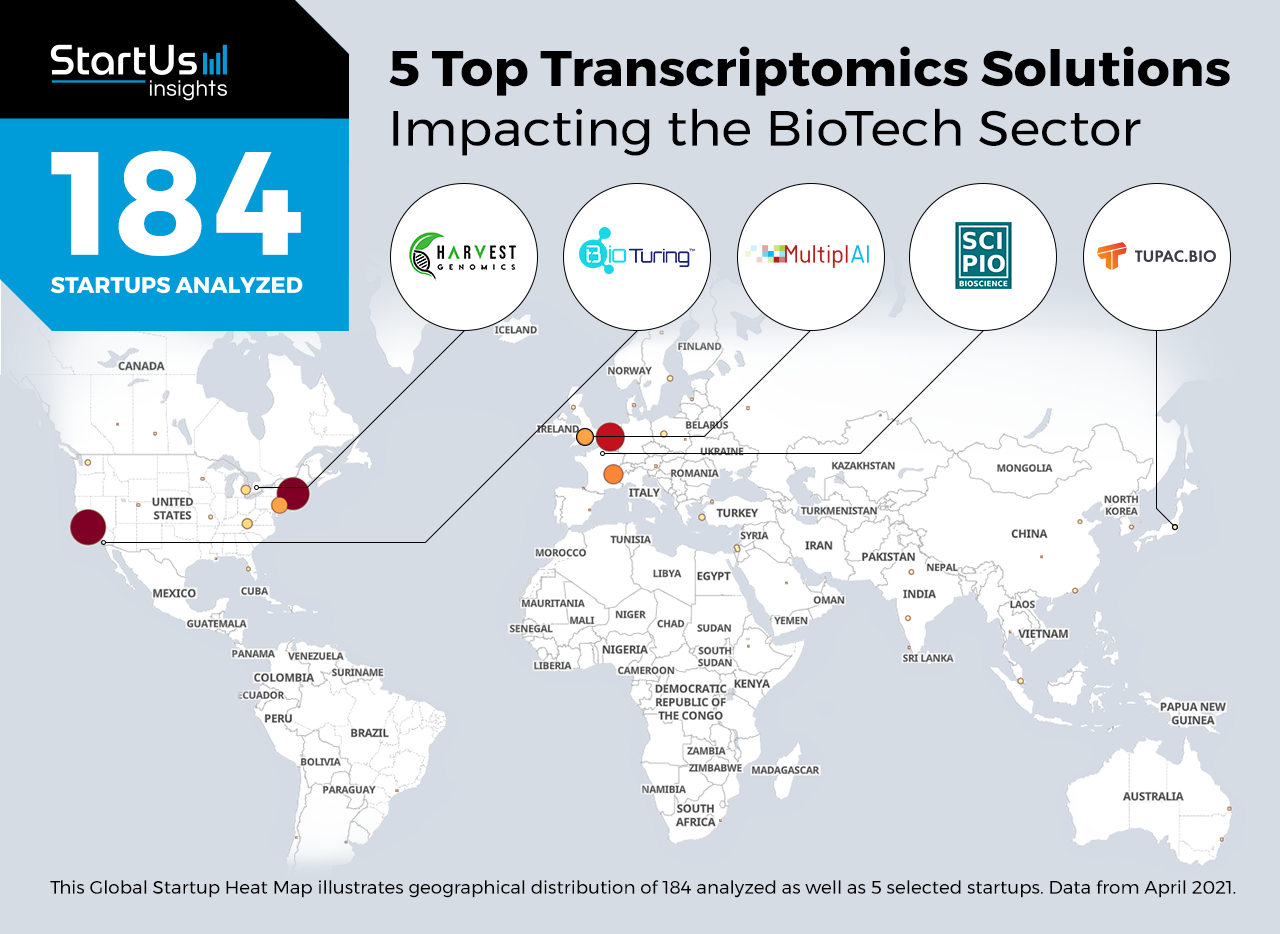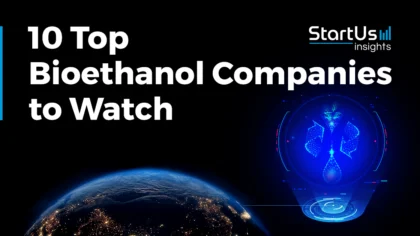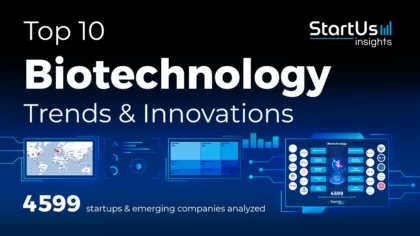Staying ahead of the technology curve means strengthening your competitive advantage. That is why we give you data-driven innovation insights into the BioTech industry. This time, you get to discover 5 hand-picked startups developing transcriptomics solutions.
Global Startup Heat Map highlights 5 Top Transcriptomics Solutions out of 184
The insights of this data-driven analysis are derived from the Big Data & Artificial Intelligence-powered StartUs Insights Discovery Platform, covering 2.093.000+ startups & scaleups globally. The platform gives you an exhaustive overview of emerging technologies & relevant startups within a specific field in just a few clicks.
The Global Startup Heat Map below reveals the distribution of the 184 exemplary startups & scaleups we analyzed for this research. Further, it highlights 5 BioTech startups that we hand-picked based on criteria such as founding year, location, funding raised, and more. You get to explore the solutions of these 5 startups & scaleups in this report. For insights on the other 179 transcriptomics solutions, get in touch.
Scipio enables Single-Cell Transcriptomics
Transcriptomics allows researchers to quantify gene expression, deriving insights about which genes are expressed and when. However, for cases of heterogeneous cell expression such as tumors, there is a high variability of gene expression within cells. As the name suggests, single-cell transcriptomics enables single-cell resolution into the activity of genes. This finds applications across oncology, immunology, and neurology.
French startup Scipio Bioscience develops solutions for single-cell transcriptomics. The startup’s proprietary technology simplifies the preparation of samples for single-cell profiling. The benchtop kit extracts messenger RNA (mRNA) from single cells. It then combines biochemical and biophysical techniques to enable single-cell barcoding in a test tube format.
Tupac Bio offers Nanopore RNA Sequencing
Early transcriptomics solutions were limited in the kind of RNA molecules they were capable of processing. This excludes long RNA or RNA in its context. Nanopore RNA sequencing overcomes this by capturing entire transcripts in single reads. It allows for direct sequencing of RNA molecules, preventing the polymerase chain reaction (PCR) biases.
Tupac Bio is a Japanese startup offering nanopore RNA sequencing. It performs RNA sequencing (RNAseq) and downstream analysis to identify changes in gene expression. Moreover, data from long-read sequencing enables genome annotation. The startup’s solution finds applications in cancer therapy, diagnostics, and the characterization of complex viral genomes.
BioTuring analyzes Spatial Transcriptomics Data
Spatial transcriptomics determines the relationship between gene expression and spatial coordinates. It allows researchers to figure out how gene expression correlates with spatial coordinates. This provides insights into gene expression at both cellular and subcellular levels. Because it offers deep spatiotemporal insights into tissues, spatial transcriptomics finds numerous applications in the biomedical and biopharma sectors.
US-based startup BioTuring provides bioinformatics platforms for next-generation sequence analytics. BBrowser, the startup’s platform for single-cell and spatial transcriptomics, derives valuable insights from raw transcriptome data. It offers various visualization tools to compare gene expression among layers and identify signatures for enriched processes. Moreover, it allows easy access to large amounts of curated, transcriptomic datasets to accelerate the drug discovery process.
MultiplAI Health offers Liquid Biopsy Screening
Diagnostics solutions generally focus on one or a few biomarkers in blood. However, most diseases are determined by multiple molecules. Transcriptomics allows the detection of all RNA in a blood sample, enabling the diagnosis of a large number of diseases. This improves both prognosis and diagnosis, in turn, reducing cost and time.
British startup MultiplAI Health offers liquid biopsy screening for cardiovascular diseases. The startup’s proprietary technology combines RNA sequencing, bioinformatics, and deep learning to measure biomarkers in blood. It transforms RNAseq data into formats that make it accessible to algorithmic analysis. The startup’s solution enables high diagnostic accuracy at lower costs than conventional solutions.
Harvest Genomics works on Plant Gene Expression
Just as multiple genes determine disease states, a large number of genes are involved in other complex phenotypes. For plant breeding, transcriptomics allows agronomists to compare expression of hundreds of genes with the phenotype. It further enables the identification of novel transcripts, pathway analysis, and co-expression network analysis. This helps speed up the development of new crop varieties.
Canadian startup Harvest Genomics delivers transcriptomics solutions for food production and food safety. The startup’s bioinformatics pipeline supports quality control, transcript assembly, and differential gene expression (DEG) analysis, as well as gene ontology and enrichment. It advances molecular breeding approaches to produce better crop varieties.
Discover more BioTech Startups
BioTech startups such as the examples highlighted in this report focus on gene editing, tissue engineering, artificial proteins as well as biomanufacturing. While all of these technologies play a major role in advancing the BioTech industry, they only represent the tip of the iceberg. To explore more BioTech technologies, simply get in touch to let us look into your areas of interest. For a more general overview, you can download our free BioTech Innovation Report to save your time and improve strategic decision-making.









